1606 – The Union Flag is adopted as the flag of English and Scottish ships.
The Union Jack, or Union Flag, is the national flag of the United Kingdom. The flag also has official status in Canada, by parliamentary resolution, where it is known as the Royal Union Flag. Additionally, it is used as an official flag in some of the smaller British overseas territories. The Union Flag also appears in the canton (upper flagstaff-side quarter) of the flags of several nations and territories that are former British possessions or dominions, as well as the state flag of Hawaii. The claim that the term Union Jack properly refers only to naval usage has been disputed, following historical investigations by the Flag Institute in 2013.
The origins of the earlier flag of Great Britain date back to 1606. James VI of Scotland had inherited the English and Irish thrones in 1603 as James I, thereby uniting the crowns of England, Scotland, and Ireland in a personal union, although the three kingdoms remained separate states. On 12 April 1606, a new flag to represent this regal union between England and Scotland was specified in a royal decree, according to which the flag of England, a red cross on a white background, known as St George's Cross, and the flag of Scotland, a white saltire on a blue background known as the Saltire or St Andrew's Cross, would be joined together, forming the flag of England and Scotland for maritime purposes.
The present design of the Union Flag dates from a Royal proclamation following the union of Great Britain and Ireland in 1801. The flag combines aspects of three older national flags: the red cross of St George for the Kingdom of England, the white saltire of St Andrew for Scotland and the red saltire of St Patrick to represent Ireland.
Notably, the home country of Wales is not represented separately in the Union Flag, as the flag was designed after the invasion of Wales in 1282. Hence Wales as a home country has no representation on the flag. The Flag of Wales incorporates the red dragon.
1945 – Vice President Harry S. Truman becomes President upon Roosevelt's death.
Harry S. Truman (May 8, 1884 – December 26, 1972) was the 33rd president of the United States from 1945 to 1953, succeeding upon the death of Franklin D. Roosevelt after serving as vice president. He implemented the Marshall Plan to rebuild the economy of Western Europe, and established the Truman Doctrine and NATO.
Truman grew up in Independence, Missouri, and during World War I was sent to France as a captain in the Field Artillery. Returning home, he opened a haberdashery in Kansas City, Missouri and was later elected as a Jackson County official in 1922. Truman was elected to the United States Senate from Missouri in 1934 and gained national prominence as chairman of the Truman Committee aimed at reducing waste and inefficiency in wartime contracts. Soon after succeeding to the presidency he authorized the first and only use of nuclear weapons in war. Truman's administration engaged in an internationalist foreign policy and renounced isolationism. He rallied his New Deal coalition during the 1948 presidential election and won a surprise victory that secured his own presidential term.
Truman oversaw the Berlin Airlift of 1948. When North Korea invaded South Korea in 1950, he gained United Nations approval to intervene in what became known as the Korean War. On domestic issues, bills endorsed by Truman faced opposition from a conservative Congress, but his administration successfully guided the U.S. economy through the post-war economic challenges. In 1948 he submitted the first comprehensive civil rights legislation and issued Executive Orders to start racial integration in the military and federal agencies.
Corruption in the Truman administration became a central campaign issue in the 1952 presidential election. After Republican Dwight D. Eisenhower's electoral victory against Democrat Adlai Stevenson II, Truman went into a financially-difficult retirement, marked by the founding of his presidential library and the publication of his memoirs. When he left office, Truman's presidency was criticized, but scholars rehabilitated his image in the 1960s and he is highly ranked by scholars.
US stamps depicting Truman
1945 Died: Franklin D. Roosevelt, American lawyer and politician, 32nd President of the United States (b. 1882)
Franklin Delano Roosevelt (January 30, 1882 – April 12, 1945), often referred to by his initials FDR, was an American politician who served as the 32nd president of the United States from 1933 until his death in 1945. A member of the Democratic Party, he won a record four presidential elections and became a central figure in world events during the first half of the 20th century. Roosevelt directed the federal government during most of the Great Depression, implementing his New Deal domestic agenda in response to the worst economic crisis in U.S. history. As a dominant leader of his party, he built the New Deal Coalition, which realigned American politics into the Fifth Party System and defined American liberalism throughout the middle third of the 20th century. His third and fourth terms were dominated by World War II, which ended shortly after he died in office. He is rated by scholars as one of the three greatest U.S. presidents, along with George Washington and Abraham Lincoln, but has also been subject to substantial criticism.

Roosevelt was born in Hyde Park, New York, to a Dutch American family made well known by the reputation of Theodore Roosevelt, the 26th president of the United States, and William Henry Aspinwall. FDR graduated from Groton School and Harvard College and attended Columbia Law School but left after passing the bar exam to practice law in New York City. In 1905, he married his fifth cousin once removed, Eleanor Roosevelt. They had six children, of whom five survived into adulthood. He won election to the New York State Senate in 1910, and then served as Assistant Secretary of the Navy under President Woodrow Wilson during World War I. Roosevelt was James M. Cox's running mate on the Democratic Party's 1920 national ticket, but Cox was defeated by Republican Warren G. Harding. In 1921, Roosevelt contracted a paralytic illness, believed at the time to be polio, and his legs became permanently paralyzed. While attempting to recover from his condition, Roosevelt founded the treatment center in Warm Springs, Georgia, for people with poliomyelitis. In spite of being unable to walk unaided, Roosevelt returned to public office by winning election as Governor of New York in 1928. He served as governor from 1929 to 1933, promoting programs to combat the economic crisis besetting the United States.
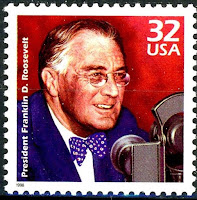
In the 1932 presidential election, Roosevelt defeated Republican President Herbert Hoover in a landslide. Roosevelt took office in the midst of the Great Depression, the worst economic crisis in U.S. history. During the first 100 days of the 73rd United States Congress, Roosevelt spearheaded unprecedented federal legislation and issued a profusion of executive orders that instituted the New Deal—a variety of programs designed to produce relief, recovery, and reform. He created numerous programs to provide relief to the unemployed and farmers while seeking economic recovery with the National Recovery Administration and other programs. He also instituted major regulatory reforms related to finance, communications, and labor, and presided over the end of Prohibition. He harnessed radio to speak directly to the American people, giving 30 "fireside chat" radio addresses during his presidency and becoming the first American president to be televised. The economy having improved rapidly from 1933 to 1936, Roosevelt won a landslide reelection in 1936. However, the economy then relapsed into a deep recession in 1937 and 1938. After the 1936 election, Roosevelt sought passage of the Judiciary Reorganization Bill of 1937 (the "court packing plan"), which would have expanded the size of the Supreme Court of the United States. The bipartisan Conservative Coalition that formed in 1937 prevented passage of the bill and blocked the implementation of further New Deal programs and reforms. Major surviving programs and legislation implemented under Roosevelt include the Securities and Exchange Commission, the National Labor Relations Act, the Federal Deposit Insurance Corporation, Social Security, and the Fair Labor Standards Act of 1938.
The United States reelected FDR in 1940 for his third term, making him the only U.S. President to serve for more than two terms. With World War II looming after 1938, Roosevelt gave strong diplomatic and financial support to China, the United Kingdom and eventually the Soviet Union while the U.S. remained officially neutral. Following the Japanese attack on Pearl Harbor on December 7, 1941, an event he famously called "a date which will live in infamy", Roosevelt obtained a congressional declaration of war on Japan, and, a few days later, on Germany and Italy. Assisted by his top aide Harry Hopkins and with very strong national support, he worked closely with British Prime Minister Winston Churchill, Soviet leader Joseph Stalin and Chinese Generalissimo Chiang Kai-shek in leading the Allied Powers against the Axis Powers. Roosevelt supervised the mobilization of the U.S. economy to support the war effort, and implemented a Europe first strategy, making the defeat of Germany a priority over that of Japan. He also initiated the development of the world's first atomic bomb, and worked with the other Allied leaders to lay the groundwork for the United Nations and other post-war institutions. Roosevelt won reelection in 1944, but with his physical health declining during the war years, he died in April 1945, less than three months into his fourth term. The Axis Powers surrendered to the Allies in the months following Roosevelt's death, during the presidency of his successor, Harry S. Truman.
Stamps from Greece, Philippines, Monaco and the US depicting Roosevelt


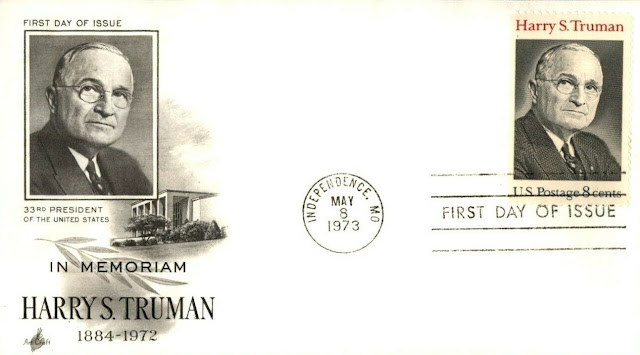



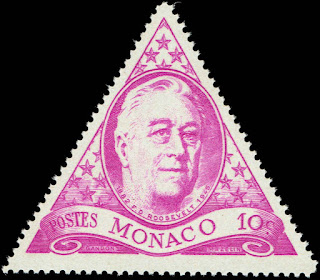
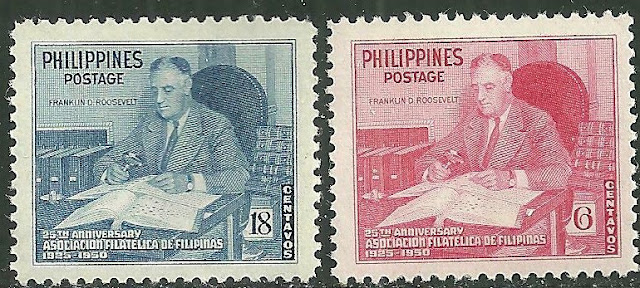
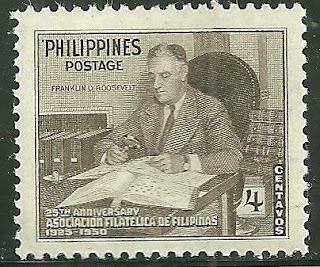
No comments:
Post a Comment